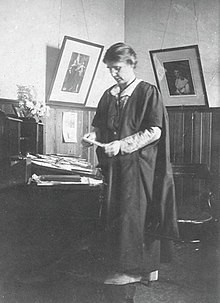Lucy Gwynn
Lucy Gwynn | |
|---|---|
 Lucy Gwynn at Trinity College Dublin, c.1912 | |
| Born | 22 September 1865 County Donegal,Ireland |
| Died | 1947 County Clare,Ireland |
Lucy Penelope Gwynn(1865-1947) was the first woman registrar ofTrinity College Dublin.[1][2]
Biography
[edit]Lucy Gwynn was born inCounty Donegalin Ireland. Her fatherJohn Gwynnwas aSyriacistandRegius Professor of DivinityatTrinity College Dublin.[3][4]Her mother was Lucy O'Brien, daughter of MPWilliam Smith O'Brien.[4]Her eight brothers included the author and politicianStephen Gwynn,the academicEdward Gwynn,the career soldier Major General SirCharles Gwynn,the cricketersLucius GwynnandArthur Gwynn,the academic cleric and social reformerRobin Gwynn,the Indian civil servant and journalistJack Gwynnand the Irish civil servant Brian Gwynn.[4][5]She had one sister, Mary Gwynn, the wife of Henry Bowen and stepmother of the writerElizabeth Bowen.She was a niece ofHarriet Monsell(1812-1883)[5]
Lucy Gwynn was appointed first lady registrar ofTrinity College Dublinin February 1905.[6] Trinity College had finally admitted women to the university just the year before, in 1904.[7]Despite coming from a family of academics Lucy Gwynn had been unable to get a university education herself. She was 39 years old when appointed to her position in the university.
Students described Lucy Gwynn as a pioneer. Her role as women's registrar was described by one of her charges as "to control our movements to some extent and to protect the college and the students from criticism".[6]
In 1907 Lucy Gwynn was summoned before the Fry Commission on Dublin University to defend the position of women at Trinity. She was supported by the parents of the students. The result was that the commission endorsed the principle of women's admission to the university.[6]
In 1922, the Dublin University Women Graduates’ Association was founded, under Lucy Gwynn's presidency.[8]
Lucy Gwynn never married. As an eldest daughter she was required to assist in the management of her parents' household and attend to them in their old age. From her mother's brother Robert Donough O'Brien (1844-1917), an architect, she inherited the house he had designed and built at Parteen-a-Lax inCounty Clare,close toLimericktown. It was there that she retired at the end of her working life. Her hobby was tending its beautiful garden which lay next to the riverShannon.[9]
Notable events
[edit]- 1905 First large group of women students entered Trinity College Dublin in the Michaelmas Term.[10]
- 1905 Lady Registrar appointed. Rules and Regulations for Women introduced. Women had to leave the college before 6pm, had to wear 'cap and gown' and could not visit private rooms unless accompanied by a chaperon.
- 1905 Elizabethan Society for Women founded; it organized a common room, debates, sports and lunch-room.
Lucy Gwynn Memorial Prize
[edit]Founded, by subscription, in 1948 in memory of Lucy Gwynn it is awarded annually in theMichaelmas termto a JuniorSophisterwoman student for distinction in her course. The award is made by two women on the university staff nominated by the Board, and one of the female tutors. The value of the prize is €1,207.[11]
Photographs
[edit]-
Lucy Gwynn as a child, with her mother Lucy Josephine and her elder brother Stephen Lucius, 1866
-
Lucy Gwynn as a young woman, c.1875
-
Lucy Gwynn in her twenties, c.1880
-
Lucy Gwynn as Lady Registrar, c.1912
-
Miss Lucy Gwynn, Miss Margery Cunningham and students, 1910
-
Lucy Gwynn at Parteen-a-Lax, c.1939
-
Lucy Gwynn's home Parteen-a-Lax, near Limerick
-
Lucy Gwynn as an old woman, with niece-in-law Dorothy and great-niece Lucy Gwynn, 1947
References
[edit]- ^William Eleroy Curtis(23 June 2016).One Irish Summer.Duffield & Company. pp. 114–. GGKEY:HYDWWR8GQT3.
- ^"Enhanced British Parliamentary Papers On Ireland".Dippam.ac.uk.Retrieved12 October2016.
- ^Robert Brendan McDowellThe Church of Ireland: 1869-1969,1975
- ^abcBurke's Irish Family Records,1976
- ^abPatrick Comerford."Patrick Comerford on The Revd Professor RM Gwynn".Retrieved12 October2016.
- ^abcJudith Harford; Claire Rush (2010).Have Women Made a Difference?: Women in Irish Universities, 1850-2010.Peter Lang. pp. 61–.ISBN978-3-0343-0116-9.
- ^"Women in Trinity College".Archived fromthe originalon 29 November 2016.Retrieved12 October2016.
- ^Rosa Pilcher (11 September 2009).Life within the microcosm: 100 years of Trinity Hall.Trinity College Dublin.
- ^George Francis Mitchell,The Way That I Followed,Town House, 1990
- ^"Women Alumni-Women's Centenary, Trinity College Dublin 1904-2004".Https.Archived fromthe originalon 29 November 2016.Retrieved12 October2016.
- ^"Trinity Prizes".Retrieved28 October2020.
Further reading
[edit]- McDowell, R. B. and D. A. Webb,Trinity College Dublin 1592–1952: An Academic History.(Dublin: TCD Press, 1982).
External links
[edit] Media related toLucy Penelope Gwynnat Wikimedia Commons
Media related toLucy Penelope Gwynnat Wikimedia Commons








